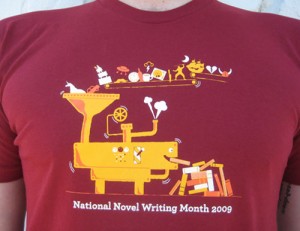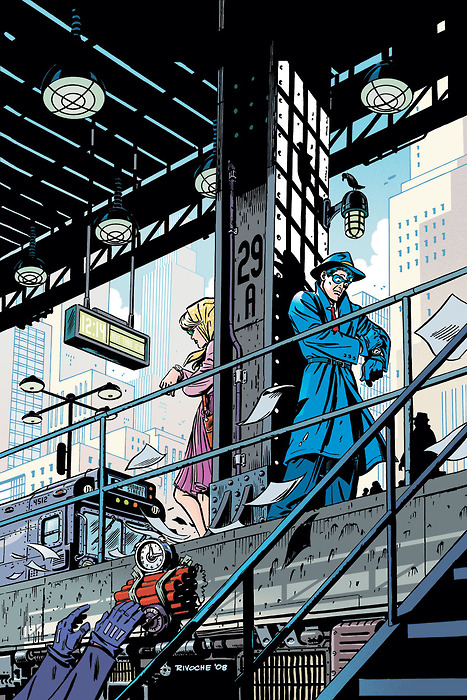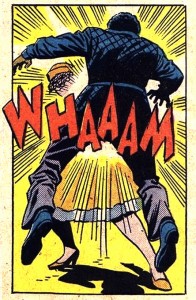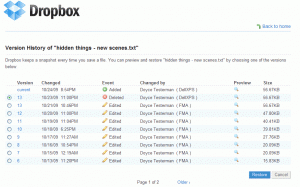Okay folks, short and sweet: here’s a hardcore, kick-you-in-the-junk trick for keeping yourself motivated during Week Two.
1. Buy a NaNoWriMo t-shirt. 
2. Consider the guilt you’ll feel for owning the t-shirt without earning it.
3. Write.
Okay folks, short and sweet: here’s a hardcore, kick-you-in-the-junk trick for keeping yourself motivated during Week Two.
1. Buy a NaNoWriMo t-shirt. 
2. Consider the guilt you’ll feel for owning the t-shirt without earning it.
3. Write.
A shout out to those who are waaaay behind on word count. I am with you here. We will triumph. Seriously. Those people who already have 20,000 words are using robots and house pets to write their novels for them while they sleep. We don’t need that kind of help. We are tough. We are slow.
We will make it up this weekend. – Chris Baty, NaNoWriMo 2002
It’s Day Eight. You made it.
“Made what? she asked, carefully avoiding any adverbs. Wait… dammit.
Lemme explain.
There’s this interesting pattern that people fall into in doing anything difficult or new (like trying to adopt a habit of writing 1700 words every day) — many falter or fall off the wagon at the same, seemingly arbitrary points.
The magic numbers are 3, 7, and 21.
See, if people are going to quit something like a new exercise plan, or meditating in the morning, or whatever, they usually do it on the 3rd, 7th, or 21st day. I don’t think anyone really knows why this is, but it’s an actual thing that happens.
Pat yourself on the back: if you’re still seriously working on your project, you have passed two of the three giving-up hurdles.
You can do this.
Oh, and look: a cool essay from Neil Gaiman that you can read, instead of writing.
You get ideas from daydreaming. You get ideas from being bored. You get ideas all the time. The only difference between writers and other people is we notice when we’re doing it.
A few days ago, in the comments, Chuck said:
I usually aim for the middle ground on first drafts — I know it’s not going to be perfect, but I aim for a solid B to B+ range. Hell, I’m going to go through five drafts anyway — but if my first draft is littered with lots of little problems, I’m looking at six or seven drafts. Further, the little issues take a lot lot lot of time to go back and fix. So, for me, it’s a matter of economizing the process. Fixing small errors now — largely by making sure they don’t happen in the first place — actually saves me a shit-ton of time on the back end.
So here’s the thing. Chuck is totally right.
I’m walking a dangerous line here, because when you’re working a NaNoWriMo project, going back and editing is a phenomenally bad idea that will put you in the hole on wordcount faster than anything, so I don’t want to tell you to do any editing at this point. Perish the thought.
But there are a few things you can do using your brain-thinking-thing so the words you put down aren’t as bad as they might otherwise be. A few very very very simple rules you can follow.
However, I still wouldn’t mention them, except for one thing.
*looks around*
*leans in*
*whispers*
A couple of these rules, like the one I’m going to talk about today, will actually give you more words than if you don’t follow it.

The road to hell is paved with adverbs. – Stephen King
That’s a pretty strong vote against the adverb. It’s a pretty widely accepted rule among writers, though perhaps King is the most passionate about it.
Well, and me. I’m kind of rabid about adverbs, but not for the same reason. I don’t like them because they kill my word count.
Examples:
“What’s up?” he said smilingly.
*wince* Right. That sucks. Let’s try it without the adverb.
“What’s up?” he said with a smile.
Ehh. Better. Marginally less wince-worthy, and more words. Okay. Some people will grouse about how words can’t come with a smile, but whatever.
Now, once you’ve broken your two-pack-a-day adverb habit, you can take it a step further by avoiding those “with a…” phrases. I don’t know what they’re called in grammar books; prepositions? Maybe. Not all prepositional phrases are bad — most aren’t — but those ‘with a …’ phrases are really just a way of writing adverbs without writing adverbs. You’re cheating yourself.
“What’s up?” he said, smiling as he spoke.
Better! Considerably less suckitude. More words. Win/win.
Maybe you could…
“What’s up?” he said. He was smiling as he spoke; the particular smile I liked to imagine he saved just for me.
Bam. Maybe not the great american novel, but exponentially better than “smilingly”.
There’s your first dirty writing trick: No adverbs.
Now get back to work.
Have fun.
Maybe it was your first day.
That happens. The first time I decided to do NaNoWriMo, I had already scheduled a convention for November 1st through the 3rd, so I hit the 4th with about 1300 words.
Maybe it was Day 3. You had two big, exciting, productive bursts, and then you hit Tuesday and work kicked your ass all day and you just knew there was no way you were getting to 5000 words.
Maybe it was Day 4 and you just … totally … forgot. Believe me, that happens.
Maybe you’re a secret detective, and you made this fundamental error in judgement:

Maybe you’re learning how to do podcasts, and your first one takes five and a half hours to finish up, instead of one. *looks guilty*
The details may vary, but the end result is pretty much the same: you, innocently standing there, and the daily wordcount for NaNoWriMo comes up and…

Knocks the air right out of you, doesn’t it? It’s okay, Tiger; shake it off. Sit on a chair and bounce up and down a couple times, with your legs together. It helps.
I talked a couple days ago about how we have to remember that all this writing stuff is supposed to be fun, or else why do it?
And that’s true. That’s absolutely true. But I need to share the other half of formula, and it’s pretty technical, so bear with me:
It’s also work. Work we love, yes, but work.
A writer is someone for whom writing is more difficult than it is for other people. – Thomas Mann
I don’t know if you can imagine doing something you really love as your actual for-pay job, but I want you to try. If you really can’t do it, try to find someone who has a job like that, and ask them if they ever get tired of it; if they ever feel like calling in sick so they can play Torchlight all day.
Feeling like that is easy to imagine, really, because we all feel like that sometimes. And we still go in. We still do the work. Maybe not always, but usually.
Thing is, this month, you need to have that “get it done anyway” attitude about writing. Even though you love it, because the day will come where you just don’t feel like it or you get discouragingly behind on your word count and you want to give up. You especially need to have that attitude on the day after you blew your writing goal and you have catching up to do. You’re going to have to take more than four of those elephant bites today; sit at the keyboard longer; stay up later than you’d like, and wake up tired.
It’s called “overtime”; butt in the chair, hands on the ‘board. Tappity tap.
Some people think that treating it like work will take away the magic of creation and imagination and the glittery pixies will abandon them and … I dunno. Whatever people like that say.
I have names for people who think like that. I call them “That guy that didn’t finish this year.”
So you’re behind.
Big deal. So am I. I’m gonna fix it.
Tonight, I’ll write until I get caught up. Tomorrow, I’ll write some more.
“Weekend” is just another word for “no one’s fucking interrupting me.”
Overtime. Work. Fun work, most of the time, but work.
Get to it. Let the pixies take care of themselves.
“You fail only if you stop writing.” – Ray Bradbury
All right. Let me get this key bit out of the way:
Do not take my writing advice.
Have I published some stuff? Yeah. Have I written stuff and gotten paid for it? Yeah. Have I ‘found’ an agent who was willing to represent my longer work? Again, yeah.
But I don’t know what I’m doing. I’m a total effing noob.
But NaNoWriMo? My people, I can do NaNoWriMo. To quote Samuel L. “Bad Motherfucker” Jackson, I’m the NaNoWriMo Foot fuckin’ Master.
One year, I got food poisoning and spent three days in intensive care. And finished. Another year, I did it with fifty people reading and commenting and bitching about each day’s output. And finished. Once, I started eight days late, landscaped my front yard, tiled my kitchen and master bath, and found out I was gonna be a daddy. And finished. I’ve done it as a big group project. Twice. I did one with a 3 year old underfoot. And finished.
Point is, I can’t give you much advice on writing (and what I can give you, you should fucking well ignore), but I know how to do this NaNoWriMo thing (and maybe have something decent afterwards), and I’d like to share a few tips on the how.
Just a few. Like… five, maybe. Let’s go for five.
1. When you’re writing, write
“Planning to write is not writing. Outlining…researching…talking to people about what you’re doing, none of that is writing. Writing is writing.” – E.L. Doctorow
Here’s the thing. You aren’t going to have much time every day to write, unless you quit your job or something. (Pro tip: don’t quit your job.) What that means is when you get 20 minutes to write, you need to write. Don’t Google facts to fill in your story with. Don’t look up a n y t h i n g on Wikipedia. Stay the fuck away from tvtropes.org.
(Jesus, I just lost like half of you to tvtropes.org, didn’t I? Dammit. There’s half your day gone, and you people are going to blame me.)
If you think you need a fact in the story, make something up. If you don’t want to do that, then put some kind of flag in the text that tells you to come back LATER and fill in the fact. I use [these things].
“Are you fucking kidding me, Tom? It’s going to take us [fact here] days just to get to the base camp — no way will the time-lemurs survive.”
Like that. Except not crappy. Then you can just come back later and do a search for ‘[‘ or ‘]’, and find all the places where you need to fill stuff in.
The point is, if you have like a half-hour to get some words down right now, you’d better get some words down.
2. Four bites, every day
Roger Zelazny said:
I try to write every day. I used to try to write four times a day, minimum of three sentences each time. It doesn’t sound like much but it’s kinda like the hare and the tortoise. If you try that several times a day you’re going to do more than three sentences, one of them is going to catch on. You’re going to say “Oh boy!” and then you just write. You fill up the page and the next page But you have a certain minimum so that at the end of the day, you can say “Hey I wrote four times today, three sentences, a dozen sentences. Each sentence is maybe twenty word long. That’s 240 words which is a page of copy, so at least I didn’t goof off completely today. I got a page for my efforts and tomorrow it might be easier because I’ve moved as far as I have.
Dave quotes this bit quite a bit – he’s got a system based around this. Me, I just quote it to remember a few things:
Listen. I am possibly the worst worker ever in the history of working. I screw around all. the. damn. time. Poke at a presentation for 20 minutes. Check GMail. Poke another ten minutes. Read the news reader. Answer two emails. Check on Twitter. Repeat. One of my bosses told me once that he’d never met anyone in his life that screwed around so much and still got more shit done than everyone else.
That last bit is key. Somehow, I still get the work done. I do that by taking small bites all day long. There’s an old saying about learning things that goes something like “you can’t eat an elephant all at once, but you can eat him one bite at a time.” That’s fine for learning, but it’s slightly different for writing.
I’m not trying to eat an elephant; I’m trying to kill that dirty bastard, and all I have are my bare hands and my teeth, so I bite the son of a bitch to death.
Takes me about a month.
Right? So make sure you find enough time to take, as per Zelazny, four bites a day. Four spots in each day when you can write for at about 30 minutes. Then, as I already said, make sure you WRITE.
Write rhymes with bite, according to my daughter. This is no coincidence.
3. Moods are for sex. Writing ain’t sex.
I don’t know how to say this any better. You need to be at your special table at your special coffee shop with your lucky cup and your specially-made NaNoWriMo iPod mix playing, so you can write?
That’s… special.
Screw that. Screw it right in the ear. Write EVERYWHERE. Write when you’ve got five minutes, waiting at Great Clips. I don’t care if it’s three goddamn words. I don’t care if it wouldn’t fill up a post on Twitter. Get em down.
I know this doesn’t entirely jive with the four bites a day advice. That’s because I’m inconsistent and what works one day doesn’t always work the next day, so you basically have to be ready to jump at the chance to write something down at any time.
Four bites is a minimum, but it isn’t like any of us need to be told how to snack between meals, is it?
Never stop at the end of the chapter
You want to stop each writing bite in the middle of the action or in the middle of whatever is going on. Stop at a cliffhanger if you have to, but better yet take a break in the middle of a conversation or just as someone pulls a trigger. Cory Doctorow suggests stopping right in mid sentence, but that’s him — he does a lot of shit that maybe only works for him. (Until four years later, when everyone starts doing it and realizes it’s no big deal and who the hell does this Doctorow guy think he is, anyway?)
The reason to leave your story hanging is so you can noodle over what’s going to happen next while you’re away. You want to leave stuff up in the air so your brain can juggle with it while you’re getting your oil changed or back waxed or whatever. Stopping at some comfortable end of chapter means you can take a mental break too.
Which means that when you come back to the story, you’re like “So, what’s next?” and your brain is like “I unno.”, cuz your brain is stupid. Stupid brain.
Related to this: take breaks. Go for walks in strange directions. Read a comic book. Take showers — let the water drum some ideas through your skull — I do that one ALL THE TIME; I’m the cleanest writer on the planet.
Word processors can suck it
Don’t use Word. Don’t use Open Office. Hell, don’t even use Google Docs. You want the simplest damn tool you can use and still make sense.
I’m talking about things like WriteMonkey. Write Or Die Desktop edition. Effing NOTEPAD. (Or Metapad, which doesn’t suck.) The world is full of distractions, so about how about you don’t use a tool that has a bunch of distractions built in?
Set your Status to Busy. Better yet: Offline.
Speaking of distractions, get the hell out of Google Talk. And YIM. And AIM. And Twitter. And Facebook. And mute your cell.
If you MUST stay connected, set your status to busy and make sure you enforce it. I’m connected to Google Talk all the time, but my status is set to busy cuz… guess what?
BUSY.
The people who ignore that and IM me anyway are the people who know it’s okay that they do that for the topic at hand, and then they go away.
The people who ignore it and … don’t? They get blocked. That’s whole different post.

So… where was I? Jesus, I stopped numbering my points didn’t I? Is that more than five? It looks like more than five.
More importantly, what’s my word count?
Eh. Doesn’t matter. Lemme sum up.
Conclusion
You can do this.
It’s not hard. It’s just work. You do work every damn day and it probably isn’t something you love. This is work you love.
I do this, and I am a dopey, lazy, easily distracted, tangential sumbitch.
If I can, you can. I know it.
A picture is worth a thousand words.

Dropbox, by way of contrast, is worth several hundred thousand words, backed up nigh-instantly to every machine you use, with version information and restore capability that goes back to the creation of the document.
I probably already sent you an invite to this, but if I didn’t, let me know, and I will.
The Frankfurt TOC (Tools of Change) conference took place today, as part of the Frankfurt Book Fair (going on this week). Like the TOC Conference earlier this year, FrankfurtTOC had a lot of folks there twittering the coolest ideas, giving a kind of stop-motion summary of the talks taking place.
What follows are the posts I saw that intrigued me in one way or another.
ON PUBLISHING
ON WEB PRESENCE
ON DRM
ON AVAILABILITY
ON THE FUTURE
My impression:
Publishing, at the moment, is stuck. There’s lots of talk about how publishers need to get with it, and where publishing is now, and what they don’t want to do to solve their problems, but there’s no grand solution proposed.
At least they acknowledge the problem.
It seems that, like displaying Christmas decorations on prominent end-caps in grocery stores, people start talking about NaNoWriMo earlier and earlier every year. Not quite sure what’s up with that; wherefore art the joy of going in with no prep (no decision, in fact, about participation until the 11th hour)?
Anyway, all that chitter chatter got me thinking about it a little earlier than I might otherwise. (Read: before October 30th.) So, here’s what I’m planning:

I’m not a little excited by the whole thing.
Which is probably why I’m talking about it early.